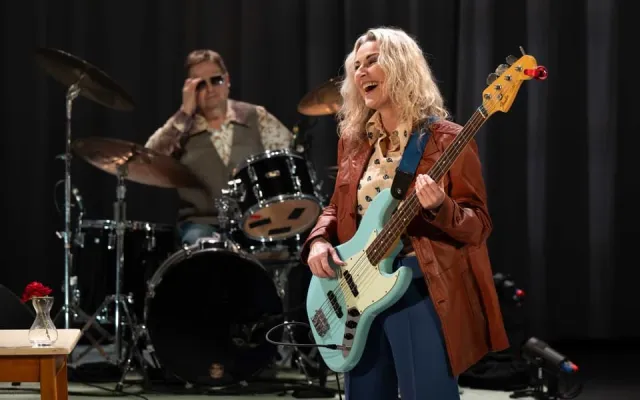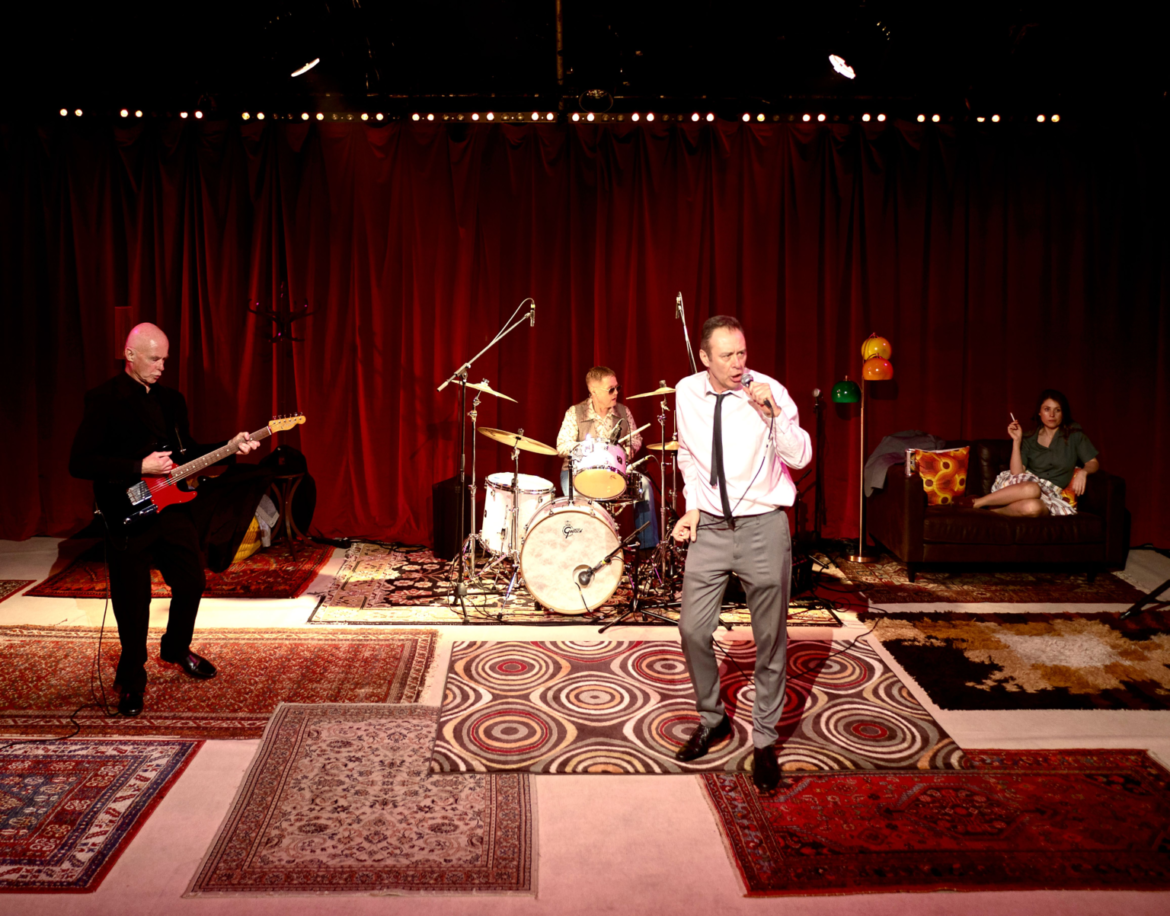Review by Simon Jenner, April 8th 2025
“This is like A Christmas Carol, only this one has cancer and guitars” announces Wilko Johnson (Johnson Willis) late on. It’s a while before we get to why this really is a game of two halves. This from a legendary guitarist and godfather of Punk, who amongst other things had appeared in Game of Thrones as an executioner with a thousand-yard stare. Premiering at Hornchurch last year, it’s now arrived at the capital. Directed by Dugald Bruce Lockhard, Jonathan Maitland’s WILKO: Love and Death and Rock ‘n’ Roll plays at Southwark Borough Large till April 19th.

Ensemble. Photo Credit:Mark Sepple
That musical distinction at first seems quite apart from being an Old Icelandic and Anglo-Saxon scholar at university, reading Paradise Lost by 16 and quipping Philip Sidney to his band mates and Irene, long-suffering teen sweetheart, later wife. Wilko Johnson’s name was in fact John Wilkinson: except call him John and he’d knock you down. But Wilko’s acute sense of verse-stricture leads him to craft lyrics with an originality that knocks the melodic pitch to an angular, angry uniqueness.
Willis is a tour-de-force but so are the other cast-members in a play with music. This five-hander starts with a diagnosis then peels back to biopic. We’re told: “In 2013, Wilko Johnson… was told he had inoperable cancer and a year to live. Refusing all treatment, he decided to spend his last months living meaningfully: seeing the people, places and things which meant most to him during his remarkable life. Then, a miracle happened…” That takes till Act Two. Act One is catch-up.
The real subject heard Maitland’s read-through of this play in 2021, and approved its contents, even recording a voiceover in case he’d not make it to the premiere. That might in a sense be the problem. Despite being an avowed warts-and-all, Maitland’s keen on a breeze-through of Wilko’s gifts and curses: his selfishness, arrogance on occasion, as well as generosity. This is a play of redemption on several levels. But one feels even Wilko mightn’t have wanted Maitland to win through to “very heaven” quite so easily (Wilko loves quoting Wordsworth). As there’s quite enough to celebrate latterly. About ten more minutes of grit, grump and struggle might still make the difference: it only runs for two hours with interval.



Georgina Fields. Photo Credit: Mark Sepple.
Verbally the great asset is peppering Wilko’s own dialogue throughout: his repartees, bon-mots, quoted retorts and self-reported threats. Of his Games of Thrones: “They told me to say nothing and look ugly and scary. Not much of a stretch.” Of being offered chemo: “I didn’t want to feel sick, and lose my hair.” Willis touches his bald pate at this point.
Wilko in rasping Essex Cockney (here kin to Steven Berkoff’s East), narrates his life with the multi-roling cast from parents through schoolteachers to band-mates and Covey Island neighbours, from where he hailed and always returned. John Wilkinson like the rest of the band sparked up his name: so ’Sparko’, ‘Brilleaux’ (aka Brillo in Franglais), and to rhyme: Wilko Johnson (and we’re reminded: “don’t ever call me John ‘cos I’ll hit you”).
The one constant from when they were 16 and 15, was Irene Knight (Georgina Fairbanks, the non-band cast-member who exudes Irene’s joy and infectious dance throughout). “Goodnight” Irene who fell in love with “John”, being allowed to use the name, and his music – she spends all her savings on buying him his first good guitar.
Irene sticks with him through all the infidelities he put her through. “I thought you’d be pleased.” “Why?” Coz I’m being honest.” This isn’t just sex, which Irene seems to accept, it’s falling in love with someone else. “I love you too of course…”
Soon we’re post-uni, post-teaching and the formation of Dr. Feelgood, briefly in the mid-1970s the most influential band in Britain. Why it didn’t quite stay that way is part of Act One.
Jon House. Photo Credit:Mark Sepple





Photo Credit: Mark Sepple
The other band-members took the kind of names twisted even further by punk, but not many had been schoolteachers like Wilko, or solicitors like vocalist and co-founder vocalist Lee Brilleaux (Jon House), with electrifying drummer Big Figure (David John), and second guitar Sparko (Georgina Fields). Each of these perform, as they have to, superbly.
Emerging from cover versions the band realise only original numbers will propel them, and Wilko can write: ’She Does It Right’ and ‘All Through the City’ power through as the band, playing to one raked set of seating in the Large – blasts out with the added glare of James Stokes’ stadium-effect lighting. Which can gradate to a bleak streetlight in Covey Island, an operating theatre (particularly transcendent, Wilko reaching his hands out from the spotlight) or a noon-bright Japanese shrine. Nicolai Hart-Hensen’s set, beyond the drumkit and guitar stands with amps stage-right, is devastatingly simple: the largest collection of Persian carpets outside a 1930s comedy. Simon Slater’s sound synchronises live music with musical effects, and epic cheers off.
The drama’s attracted a distinguished crowd of Wilko fans and experts, relatives and others who can critique the way the play has seemingly improved presentationally since its Hornchurch outing.
Irene’s grief is never processed and reimagined: this might reflect a certain reluctance. Fairbanks conjures real warmth and radiance as Irene, and this would have given her more to strengthen that. Her “Why?” over Wilko’s infidelities is so powerful you feel she wants to. Band arguments are perfunctory too.
The one quietly devastating moment of Act One comes at the end: it might have been heightened. No spoilers here. The redemptive curve of Act Two is more meaty, or less by 3KG when the tumour’s removed. Its point apart from the blaze of affirmation is to prove Wilko “less of an arsehole” where interrogations with now ghostly presences – Len for instance – interrogate even Wilko’s remorse. It’s a harder-hitting narrative, and hints at Wilko’s arrogance, indeed naivety: though ends with affirmation all round.
A blaze of a show, it feels like it needs London to tell it how to punch further (to invoke “John”). But absolutely recommended for the tremendous panache in how the cast deliver songs, and their power to evoke character: led by Willis. This could potentially be outstanding.
Costume Supervisor Caroline Hannam, Sound Engineer Dan Hunt, Production Manager Roy Gould, DSM John Boswell, ASM Sandra Szaron, Sound Operator Max Marchment,
For Covey Rock Ltd Producers Jonathan Maitland, Helena Maitland, For Cahoots Theatre Company Producer: Denise Silvey, Production Assistant Alexander Floras-Matic, Marketing & PR: Mobius Industries, Photo credit: Mark Sepple.
Photo Credit: Mark Sepple



